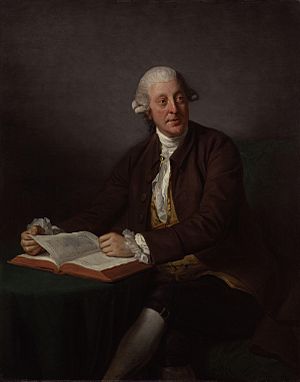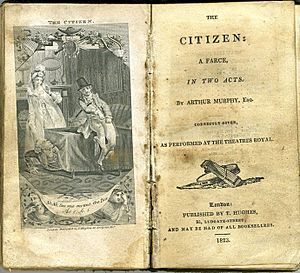Arthur Murphy (writer) facts for kids

Arthur Murphy (born December 27, 1727 – died June 18, 1805) was a talented Irish writer. He sometimes used the pen name Charles Ranger. He was known for his plays, biographies, and translations.
Contents
Biography: Arthur Murphy's Life Story
Arthur Murphy was born in Cloonyquin, County Roscommon, Ireland. His parents were Richard Murphy and Jane French.
He went to school at the College of Saint-Omer in France, which was run by Jesuits. He was a very good student, especially in Latin and Greek.
Murphy had many different jobs throughout his life. He started as an actor in the theatre. Later, he became a barrister (a type of lawyer who argues cases in court). He also worked as a journalist and edited a newspaper called Gray's Inn Journal from 1752 to 1754. Eventually, he became a playwright, writing many plays for the stage.
In 1765, he introduced his good friend Samuel Johnson to the Thrales, a well-known family. In 1803, he was given an important job as a Commissioner of Bankruptcy. This meant he helped manage cases where people or businesses couldn't pay their debts.
Arthur Murphy was famous for his translations of ancient Roman writings by Tacitus in 1753. These translations were so good that they were still being published many years later, even in 1922!
He also wrote three biographies, which are books about other people's lives:
- An Essay on the Life and Genius of Samuel Johnson (1792)
- Fielding's Works (1762)
- Life of David Garrick (1801)
Murphy is believed to have created the legal phrase "wilful misconstruction" during a court case in 1774. This case was about who owned the rights to books and writings forever.
Arthur Murphy passed away in Knightsbridge, London, and was buried in Hammersmith, London.
A book about his life was written in 1811 by Dr. Jesse Foot. A portrait of Arthur Murphy, painted by Nathaniel Dance, is now thought to be in the Irish National Portrait Collection.
His older brother, James Murphy French (1725–59), used their mother's last name. He lived in London with Arthur.
Arthur Murphy was very devoted to Ann Elliot, a talented actress. He missed her greatly after she passed away at a young age. After Murphy's death, another writer named Fanny Burney wrote about how much he cared for Ann Elliot.
Murphy's Drama: Plays for the Stage
One of Arthur Murphy's plays is called The Citizen. It's a funny play (a farce) that was first performed in 1761 at the Drury Lane theatre. Ann Elliot, who was a close friend and talented actress, played the character Maria in the play.
Here's a simple summary of The Citizen:
- Mr. Philpot, a very rich but stingy man, wants his son, Young Philpot, to marry Maria Wilding.
- Young Philpot is a bit of a troublemaker and has lost a lot of money. He tries to trick his father into giving him more money for an insurance scam.
- Maria, however, loves another man named Beaufort and plans to marry him.
- When Young Philpot tries to propose to Maria, she pretends to be silly and not very smart. This makes him not want to marry her.
- Later, Mr. Philpot visits a woman named Corinna. His son, Young Philpot, also comes to visit her. Mr. Philpot hides under a table and overhears his son bragging about how he tricked his father out of money.
- Maria's brother arrives and discovers both Philpots, leading to an embarrassing situation for them.
- In the end, Sir Jasper Wilding gets Mr. Philpot to sign papers for the marriages. But Maria, who is actually very smart, shows her true character to Young Philpot, and he again refuses to marry her.
- Old Mr. Philpot then offers to marry Maria himself, but the lawyer reveals he is actually Beaufort! He explains that he swapped the papers, so Mr. Philpot accidentally signed for Maria to marry Beaufort instead.
Works: What Arthur Murphy Wrote
Dramas
These are some of the plays Arthur Murphy wrote. The dates show when they were first performed.
- The Apprentice (1756)
- The Upholsterer (1758)
- The Orphan of China (1759), a serious play (tragedy) based on other works
- The Way to Keep Him (1760), a funny play (comedy)
- The Desert Island (1760), a dramatic poem
- The Citizen (1761)
- All in the Wrong (1761), a funny play (comedy)
- The Old Maid (1761)
- No One's Enemy But His Own (1764)
- Three Weeks After Marriage (1764)
- The Choice (1764)
- The School for Guardians (1767)
- Zenobia (1768), a serious play (tragedy)
- The Grecian Daughter (1772), a serious play (tragedy)
- Alzuma (1773), a serious play (tragedy)
- News from Parnassus, A Prelude (1776)
- Know Your Own Mind (1777), a funny play (comedy)
- The Rival Sisters (written 1783), a serious play (tragedy)
Biographies
These are the books Arthur Murphy wrote about other famous people.
- Fielding's Works (1762)
- An Essay on the Life and Genius of Samuel Johnson (1792)
- Life of David Garrick (1801)
See Also


